| Srl | Item |
| 1 |
ID:
172088
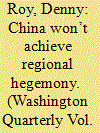

|
|
|
| 2 |
ID:
111801
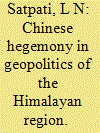

|
|
|
| 3 |
ID:
166827
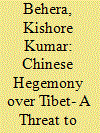

|
|
|
|
|
| Summary/Abstract |
Tibet is one of the most important bilateral issues bedeviling the relations between India and China. It is also one of the weakest links in China’s domestic policy. Tibet has enjoyed sovereignty for long spells in history. The Tibetans have a distinctive cultural identity which is fundamentally different from that of the Hans who constitute the overwhelming majority of the Chinese population.
|
|
|
|
|
|
|
|
|
|
|
|
|
|
|
|
| 4 |
ID:
110460
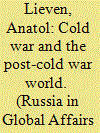

|
|
|
|
|
| Publication |
2011.
|
| Summary/Abstract |
Rather than a future in which Chinese hegemony will replace that of the United States, we seem to be rapidly entering a world in which no country will exercise anything resembling true world leadership. This bears a sinister resemblance to the 1920s, when the United States replaced Britain as the world's leading economic power, but was wholly unwilling to shoulder additional burdens of global leadership.
|
|
|
|
|
|
|
|
|
|
|
|
|
|
|
|
| 5 |
ID:
168060
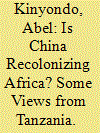

|
|
|
|
|
| Summary/Abstract |
This study assesses Sino-African cooperation with a view to understanding its nature and subsequently identifying ways to improve it. Using a mixed method that combined in-depth interviews, Afrobarometer, and Johns Hopkins’ China Africa Research Initiative (CARI) data, I find that, despite a few gains, China takes the lion’s share of benefits from the cooperation. Indeed, the balance of trade is skewed toward China, and there is very little Chinese foreign direct investment (FDI) flowing to Africa. Moreover, ‘debt trap diplomacy’ is crippling African economies, raising alarm over whether China intends to recolonize the continent. Also, while Chinese aid is negligible, the amount of contracts revenues and diplomatic support it gets from the continent makes one think Africa deserves more from the cooperation. Nevertheless, China, just like any other country, acts in its nation’s interest. Therefore, it is incumbent upon African countries to ensure that they demand more from the cooperation. In the end, to address China’s hegemony over Sino-African cooperation, Africa should prioritize the development of local content through technological and skill transfers, curb corruption, and build a critical mass of negotiators.
|
|
|
|
|
|
|
|
|
|
|
|
|
|
|
|
| 6 |
ID:
138063
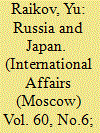

|
|
|
|
|
| Summary/Abstract |
THE MYSTIFYING TITLE is merely a statement that everything is possible in international relations even if recently a full-scale cooperation between Russia and Japan looked unreal.Today, they are pushed aside by the U.S. and rapidly developing China and play only the second fiddle in the APR political context. Their equally impressive potentials and images, as well as the cruel international realities of the early twenty-first century, force the two powers which figured prominently in the postwar history of Asia to seek ways to move closer together. Confronted with new geopolitical challenges and also threats not far from home, Russia and Japan are becoming, for objective reasons, natural strategic partners in East Asia.
|
|
|
|
|
|
|
|
|
|
|
|
|
|
|
|
| 7 |
ID:
147911
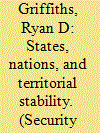

|
|
|
|
|
| Summary/Abstract |
How would a hegemonic China shape international norms related to states, nations, and territoriality? Scholars have noted the conflict between the right of minority nations to self-determine and the right of states to maintain their territorial integrity. An unrestricted application of the former would risk considerable state fragmentation; an unconditional acceptance of the latter would condemn stateless nations to a subordinate status. Powerful actors like the United States have attempted to navigate these norms by specifying the conditions under which one norm should take precedence over the other, but such decisions are difficult to make in an international environment that lacks consensus, and the result is an ambiguous international order where conflict is common. I analyze the future of these norms in a Chinese-led international order, explaining why China would champion territorial integrity over self-determination, and why this would be better for territorial stability.
|
|
|
|
|
|
|
|
|
|
|
|
|
|
|
|